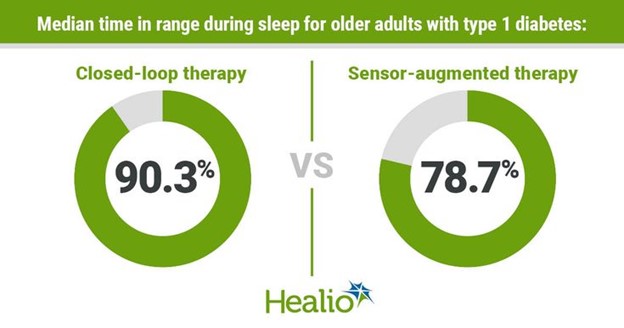Better Overnight Time-in-Range, Worse Sleep Quality with Closed-Loop Insulin Delivery
Older adults with type 1 diabetes using hybrid closed-loop insulin pump therapy had more time in range during sleep, but worse sleep quality compared with those using sensor-augmented therapy, according to study findings.
“This randomized trial provides the first evidence that, during objectively measured sleep, closed-loop automated basal insulin delivery improves time in range and results in fewer sensor hypoglycemia episodes among older adults with type 1 diabetes,” Sybil A. McAuley, MBBS, PhDFRACP, senior research fellow at the University of Melbourne in Australia, and colleagues wrote in a study published in Diabetes Technology & Therapeutics. “In the context of more frequent system alarms during sleep with closed-loop therapy, sleep quality metrics did not improve (and some deteriorated).”

Older adults with type 1 diabetes had a higher time in range during sleep using closed-loop therapy compared with sensor-augmented therapy. Data were derived from Chakrabarti A, et al. Diabetes Technol Ther. 2022;doi:10.1089/dia.2022.0110.
Researchers evaluated glucose outcomes during sleep and sleep quality as part of the Older Adult Closed-Loop randomized crossover trial. Thirty adults aged 60 years and older with type 1 diabetes for at least 10 years and using an insulin pump at enrollment were included in the analysis (median age, 68 years). Participants were randomly assigned to hybrid closed-loop therapy or sensor-augmented therapy for 4 months. At the end of the 4-month period, adults crossed over to the opposite group for another 4 months. Sleep was monitored for 14-day periods at the end of each 4-month phase. Continuous glucose monitor readings were collected for each participant. Subjective wake after sleep onset and sleep latency were recorded in sleep diaries. An actigraphy was used to estimate sleep onset and offset times. Sleep quality was self-reported daily using a 5-point Likert scale, and sleep quality from the past month was evaluated using the Pittsburgh Sleep Quality Index.
During objectively measured sleep, the median time in range was greater with closed-loop therapy compared with sensor-augmented therapy (90.3% vs. 78.7%; P = .008). Time in narrow glucose range between 70 mg/dL and 140 mg/dL was also greater with closed-loop therapy compared with sensor-augmented therapy (66.1% vs. 56.9%; P < .001). The glycemic benefits of closed-loop therapy were generally observed from the fourth hour of sleep onward. Almost all time below range with both therapies occurred within 5 hours after sleep onset. Participants had fewer sensor hypoglycemic episodes with closed-loop therapy compared with sensor-augmented pump therapy (incidence rate ratio [IRR] = 0.4; 95% CI, 0.2-0.55; P = .007).
Mean total sleep time was 13 minutes shorter with closed-loop therapy compared with sensor-augmented therapy (P = .011), though participants exceeded 7.5 hours of sleep per night with both therapies. According to daily diary sleep quality, participants were less likely to report good sleep quality with closed-loop therapy compared with sensor-augmented therapy (OR = 0.69; 95% CI, 0.52-0.9; P = .006). The frequency of total system alarms was 30% higher during closed-loop therapy compared with sensor-augmented therapy (IRR = 1.3; 95% CI, 1.12-1.52; P < .001). However, participants had fewer low glucose alarms during closed-loop therapy compared with sensor-augmented therapy (IRR = 0.54; 95% CI, 0.39-0.75; P < .001).
“Future developments in diabetes technology, including more automated closed-loop algorithms and enhanced glucose sensor technology, are likely to further improve glycemia during sleep and sleep quality in people with type 1 diabetes,” the researchers wrote. “Sleep quality warrants prioritization during the advancement of diabetes therapeutic technology.”
Please review our business at: Google Yelp Facebook
If you’d like to learn more, please visit our Member’s Area to access our subscribed content.
Did you know you can work out and exercise with a trainer at your home, office, hotel room, or anywhere in the world with online personal training?
Like us on Facebook/Connect with us on LinkedIn/Follow us on Twitter
Make sure to forward this to friends and followers!
